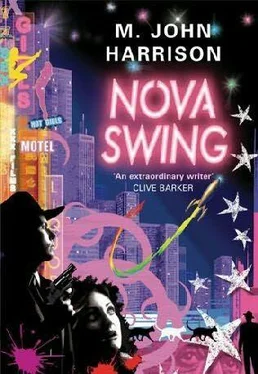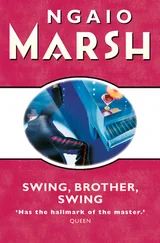Irene found him standing there, staring along the Corniche towards Saudade. Tears ran down his face.
"Antoyne, honey," she said, "what is it?"
"It was Vic. I saw him."
"Honey, you didn't. Vic is gone now and he won't return. He was too inner a man to know another way. Don't do this to yourself any more! Vic Serotonin had no heart, but Antoyne, you have all the heart in the world! Come back inside. Please come back in." Antoyne shook his head, no, but allowed her to lead him back to the Long Bar. The two-piece played, the people were squeezed out into the room. He watched them leave.
"Life always goes on, Antoyne. It always goes on."
That was the crisis for Antoyne Messner. It got easier for him after that, and he was increasingly able to learn the gifts of happiness and self-belief.
Momentum ran the Cadillac halfway up a long bank of broken earthenware tiles before it slowed suddenly, slid a little way back, then rolled on to its driver side in a cloud of dust. For a minute or two, as the slope restabilised itself through the medium of small random avalanches decreasing in force and frequency, the man who looked like Einstein did nothing. He was content to rest, hanging awkwardly against the seatbelt with his chin pushed into his clavicle.
A bluish, sourceless light lay over everything. Everything seemed mixed together. Just as fluids trickled out of the car, all sorts of thoughts and images trickled out of his mind. "This was never an investigation," he heard his assistant complain. His wife said, "Aschemann, you would give the world the whole of yourself-if only you could find it." Meeting her for the first time, he had thought the same of her. That was on the Corniche, late one summer afternoon, with the light on the sea like mild steel. She was sitting outside a cafe, in a yellow silk frock and glasses so dark that she had to raise them to see him, eating an ice. Her air was one of disorientation, her eyes looked as bruised as if their life together had already occurred. An hour later she was sitting on his lap in the back of a rickshaw, with the silk frock up round her waist.
Aschemann smiled at this memory.
He extracted himself from the seatbelt, and then the Cadillac.
He turned over the broken tiles with the toe of his shoe. "So now you're inside," he thought, "whatever happens can't be good." Then, opening a page of Emil Bonaventure's journal at random, he attempted to compare it with the landscape, as if Emil's memories could be used as a guide to his own relationship with the world.
"Vehicle broke down immediately," Bonaventure had written. "We slept in the old outfall pipe. G woke often, heard rats in the night. His ulcers no better. Four litres of water remain." This was accompanied by something between a map and a drawing, in which dotted lines connected various roughly sketched features in an arrangement without perspective, height on the page replacing distance from the viewpoint. "The expansion chamber flooded repeatedly, amp; we were forced to retrace our steps. Lupercu records 'parliament of insects' here, but I saw only woods on high ground, and an [illegible]."
"Emil, Emil," Aschemann chided, as if the old entradista was at his side. "None of us do anything for the right reasons."
He threw the book away and walked off in the direction he was facing, which happened to be upslope. After that, he seemed to wander about for some weeks. He didn't get hungry or thirsty, although he was cold at night, and his clothes fell apart rapidly. What he took to be devastation stretched away under what he took to be moonlight. Waves of difference passed through the landscape, but it remained obstinately coated with buildings. Though many of these remained intact, their doors and windows had been stripped out, and they had been emptied of anything domestic, or even human. You could see down into basements filled with tight flattened clusters of large bone-white lice, or an ionised slurry of broken smart ads like ectoplasm. To begin with, black and white cats lined the gutters, all facing away from him. There was always a note in the window; a rickshaw disappearing round a corner; a laugh but no one there. There was a smell over everything like rendered fat, which made him recall a conversation with Vic Serotonin, that corrupt tour-operator of the soul.
"Only the simple ever claim it's simple down there," Vic had said. "And what do they bring back? Fuck all. You couldn't pay for a motel room with sheets that used. The air's like lard. It's the smell of code. You see something, you break the rules, ptoof: death. Worse than death. Never pick anything up. Never let anything pick you up." As if to confirm this, or at least to gloss it, the dying advertisements detached themselves from their basement slurry to make him half-remembered promises, offers no one could ever accept or fulfil:
We carry all sex medds at bargin price
99% approval rate to take advantage of this Limited Time opportunity do not reply They were the tidal dogs, the unremembered memories, of a place never the same place twice. The most determined of them followed him for days, taking the form of small coloured lanterns or, less often, drawings of small coloured lanterns, which bobbed in the air slightly behind his left shoulder. The attrition rate was fierce. Soon only one was left. Such eloquent timepieces, it tirelessly informed him, are supposed to be owned by gorgeous females. And: You can get your deploma today. Did this count as being picked up? The detective couldn't tell. He had lost his assistant. He had lost his car. He had lost his purchase on the ordinary. In return, the site awarded him this wispy companion, lacking in stamina yet full of persistence. He wasn't sure yet what it would require of him in return. When he lay all night half-asleep in some shallow stream, he drew comfort from the ad's simple tune and soft mothy flicker; he came to feel an equally simple affection towards it.
What is a daughter?
Late one evening eight weeks after Vic Serotonin and Lens Aschemann disappeared, Edith Bonaventure squeezed into the costume she had worn at seventeen years of age and took herself to the gates of the Saudade corporate port. There, she opened an accordion case on the cement sidewalk, strapped on the instrument it contained and began to play. Cruise ships from all the major lines were in, towering above her like a mobile downtown, their abraded, seared-looking hulls curving gently into the low cloud-base. That time of night it was both raining and mist. The port halogens shone out blurry white globes, the pavement was black, slick, cut with transitory patterns of rickshaw wheels. Edith's costume, stiff faux-satin a fierce maroon colour, still fitted; though it made her look a little stocky. Unaccustomed excitement reddened her cheeks and bare thighs. For once, Edith had left her father to his own devices. He could choose to fall out of bed or he could choose to stay there: this evening, she had informed him, that was up to him. It was everyone's right to choose.
"Emil, you can watch the tour ships lift off, or maybe enjoy throwing up on yourself. Me, I am off to The World of Today to pick up a man."
"If it's convenient, the two of you can bring me back a bottle-"
"You wish."
"-then do what you do quietly for a change." Emil seemed well, perhaps he was getting over Vic's defection. Why she told him such a lie, she didn't know. All she was sure of, she wanted this other thing, she wanted to play. She had picked an accordion to match the outfit, maroon metalflake blends under a thick lacquer finish, with stamped chrome emblems of rockets and comets which caught the spaceport light like mirrors. Sometimes, as a child, Edith had less wanted to own an instrument like this than to be one, to find herself curled up inside one, like a tiny extra dimension of the music itself. Edith played Abandonada. She played Tango Zen. She played that old New Nuevo standard, A Anibal Lectur. She was quick to merge with the night, to become part of its possibility for the paying customer. Rickshaw ads fluttered round her the colours of fuchsia. The rickshaw girls called out requests as they passed; or stood a moment listening despite themselves, puzzled to be still for once, their tame breath issuing into the wet air. While up and down the rickshaw queues, the off-world women shivered-as the sad passionate tango songs made, in cheap but endlessly inventive language, their self-fulfilling prophecies of the entangledness and absurdity and febrile shortness of life-and pulled their furs around them. It was the briefest mal de debarquement. Saudade! Its very name was like a bell, tolling them back to their true, enjoyably complex selves! They laughed to wake up so far from where they started, so momentarily at a loss in the face of night and a new planet, yet so in control of the brand new experiences awaiting them there. In search of a gesture that could contain, acknowledge and celebrate this inconsistency, they threw money into the salmon pink silk interior of the fat, odd little busker's open accordion case. Sometimes the banknotes they threw floated around Edith herself like confetti at the marriage of earth and air, while she played I Am You, Motel Milongueros, and an up-tempo version of Wendy del Muerte she learned in a pilot's bar on Pumal Verde. She had no idea, really, why she had come to the gates. She was forty-two years old. She was a black-haired woman with wide, blunt hips who couldn't afford to be anyone but the self she had chosen at eleven and who, consequently, blushed up quickly under her olive skin. She was a woman of focus, a woman of whom men said to each other:
Читать дальше












